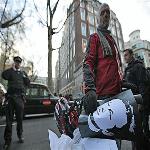09 December 2010

Photo: AP
A supporter of Wikileaks founder Julian Assange, holding a poster with his picture gathers outside the City of Westminster Magistrates Court in London where Assange's case was heard, 7 Dec, 2010
Computer hackers used to be mostly sophisticated criminals, high tech spies or new media pranksters. But now a new breed of hacker is engaged in what some call a cyber war of political activism.
In the streets of New York, these supporters of the WikiLeaks website want to send a message to anyone who will listen.
"The charges against WikiLeaks are really nothing but a fraud and a cover up," said one supporter of Wikileaks.
But top U.S. officials say classified documents released by WikiLeaks founder Julian Assange put American lives at risk, and may be criminal. Assange is now in a British jail on an unrelated sexual assault charge from Sweden.
Unlike these protesters, tens of thousands of WikiLeaks supporters are making a statement through the Internet.
A group called "Anonymous" has launched cyber attacks against companies that have stopped processing donations to WikiLeaks. Gregg Housh, a spokesman for Anonymous, said "That's made people a little upset so they've decided, 'Let's hurt those companies, let's make them understand it was a bad move.'"
Cyber attacks temporarily shut down the websites of MasterCard and Visa. Internet activists accuse the credit card companies of being against freedom of information on the Internet. Housh tells VOA that members of Anonymous consider WikiLeaks founder Julian Assange a hero who has not broken any laws by releasing classified information through his website.
Housh says Anonymous is made up of WikiLeaks supporters from around the world who are mostly in their late teens or 20s. "Anyone can be Anonymous," he said. "There's no central location there's no central server. There's no leaders."
In a Skype Interview with VOA, cyber security expert Paul Sop of Prolexic Technologies says WikiLeaks supporters involved in the latest attacks are not traditional cyber criminals and will be easier to catch. "You're going to see, from a lot of these WikiLeaks attack activity, several people go to jail from it, because they haven't been altogether clever about hiding their tracks," he said.
But cyber security experts say there is a limit to what police can do because of the large number of participants in these attacks. Another challenge for law enforcement: Sop says it is impossible to stop the flow of information even if WikiLeaks is shut down. Hundreds of mirror sites hosting WikiLeaks contents have appeared. Sop says in the time it would take to shut down one server, the information on WikiLeaks could have been copied 100 times on other websites.
"What it really means is that if you want to distribute information on the Internet, one way or another you're going to be able to do so, and it's beyond the capabilities of the human race to stop it," said Sop.
Some cyber security experts and Internet activists agree that it is too early to tell whether online protest movements will become a permanent way for people to express their ideas, or whether the activists will get bored and abandon what many are calling a cyber war.